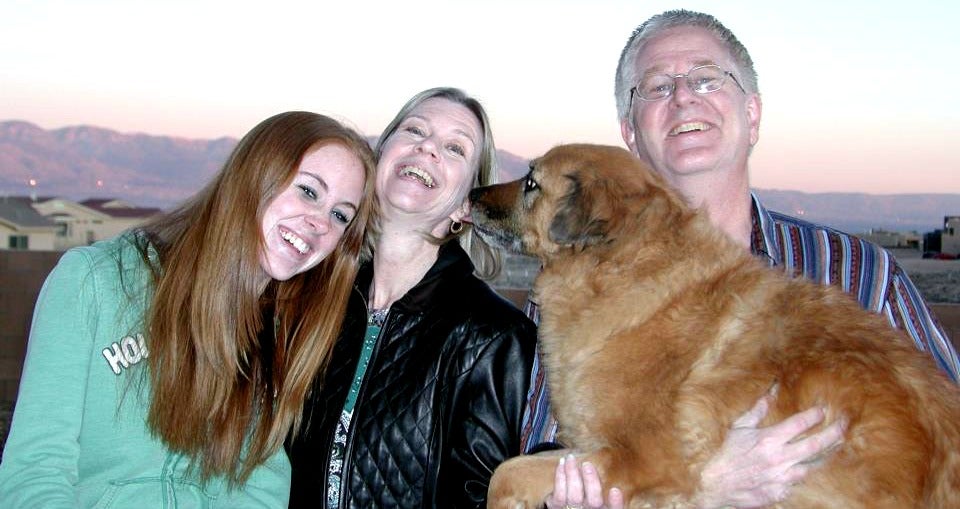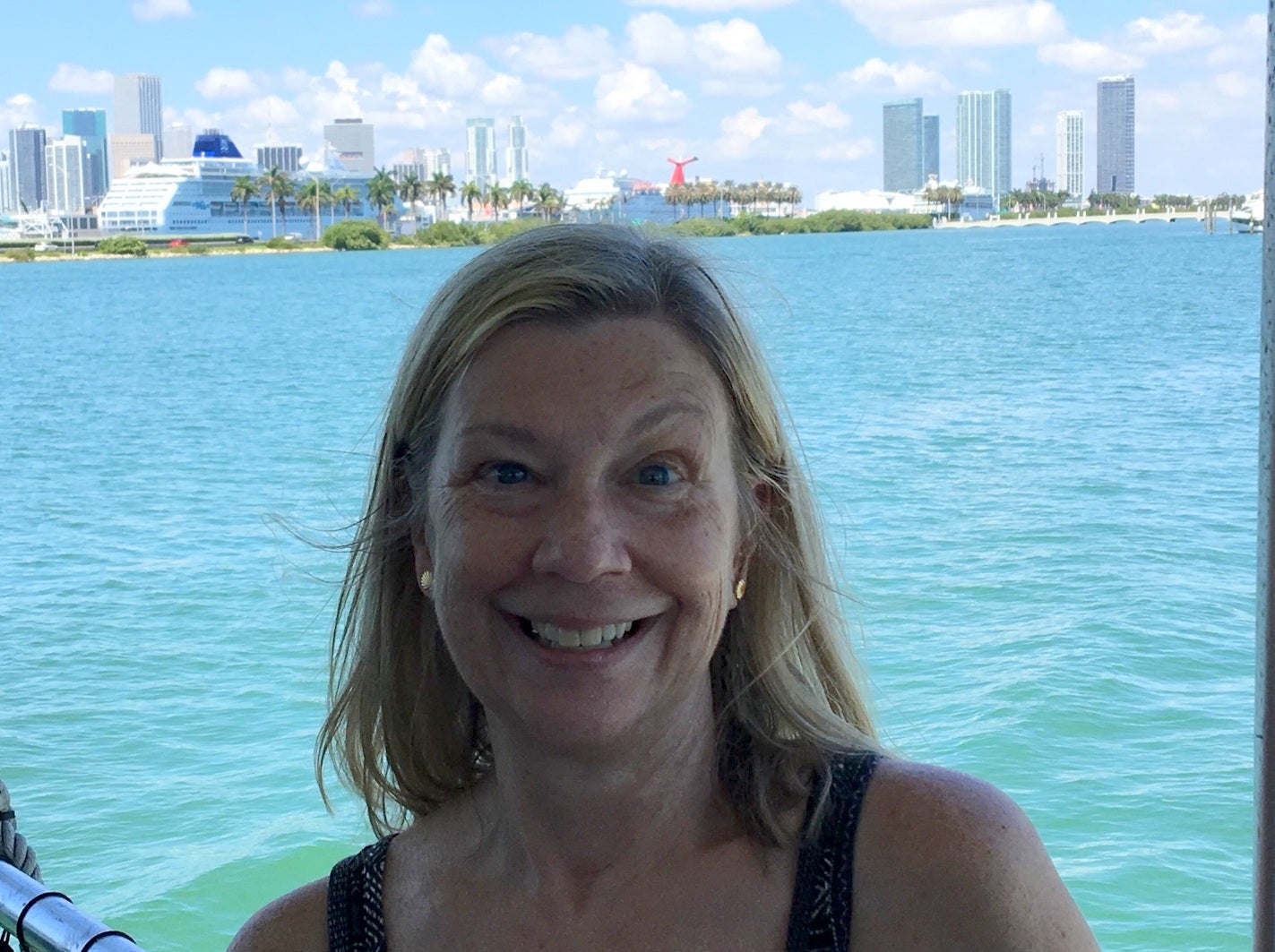
When Karen McCallum went to have a routine blood test done, she didn’t think anything was wrong with her. When her results came back, Karen found out from Dr. Angela Sanchez with Lovelace Medical Group that her thyroid levels were at 1200, when they should have been 3. “I’m a menopausal female who works in advertising and had an answer for every symptom I had,” Karen shares. “When I had heart palpitations, I thought it was because I work in a high stress environment; when I had hot flashes and sweats, I thought that was my menopause.” Little did Karen know she would spend over five years searching for the answer to her high thyroid levels and all of the symptoms she was experiencing. Eventually Karen would come to the conclusion with her doctors that she has an autoimmune disease called Graves’ disease.
Once Karen found out she had high thyroid levels, Dr. Sanchez began tests on Karen to find out the cause. “I cannot say enough about Dr. Sanchez’s care, she was very methodical and tried test after test. After three or four months, we had done every test she could think of,” says Karen. “That is when we decided I needed to see a specialist, so I went to see Dr. Marta Terlecki, an endocrinologist in Albuquerque, who works closely with Lovelace.” Once Karen saw her, Dr. Terlecki agreed Karen’s case was unusual. Karen had already had scans done and eliminated the possibility that it was her nodule glands, so Dr. Terlecki told Karen she needed a radioactive iodine uptake test (RAIU). For this test, Dr. Terlecki sent her over to Lovelace Nuclear Medicine. “They began testing, and it took around another year working with Dr. Terlecki performing test after test until she came to the conclusion that I have Graves’ Disease.”
Graves’ disease is an autoimmune disease of the endocrine system where it perceives your thyroid gland as being a foreign object and attacks it. Your thyroid gland then attacks back by producing toxic levels of its hormones. “I was very sick, but I was too afraid to have surgery or do radioactive iodine treatment, so we tried all of these other nonsurgical options. We changed my diet, my exercise and my vitamins and supplements but after two years, it just wasn’t getting any better.” Even though Karen was still scared, she decided to have total thyroidectomy surgery to remove her thyroid completely. Karen was referred to Dr. Allyson Ray, a head and neck surgeon in Albuquerque who works with Lovelace. On June 11, 2015, Karen had her surgery. “Even though I was absolutely terrified, I knew going in this surgery was going to fix me, so I was also looking forward to it. I also knew after all of the research I had done, Dr. Ray was very comfortable with this procedure and had great outcomes.”
At 6 a.m. Karen arrived at the Heart Hospital of New Mexico at Lovelace Medical Center for her surgery. “I asked Dr. Ray why I was having my surgery at the Heart Hospital, and she explained that the hospital let her perform surgeries there even though she wasn’t a heart surgeon, and she was comfortable with the configuration of the surgery, and the level of care I would receive.” Once Karen arrived, she was given her hospital bracelet, taken to billing for insurance verification, and then led to the waiting room to be called in for her surgery. “As soon as I walked into the hospital, there were several instances that struck me as examples of caring. When I was greeted at the hospital, it genuinely seemed like the staff was happy to see me and cared about me. Also, once I was brought back for surgery, my nurses, my anesthesiologist and my surgeon all made sure I was oriented with what was going on, connected with me and made me feel comfortable and cared for.”
Five hours later, Karen woke up in the recovery room. The first thing she saw was the ceiling and then the wall clock. “It was like flipping a switch; I saw that five hours had passed,  and I knew where I was and said out loud, ‘It’s over!’” Karen realized she could already talk, didn’t have any pain in her throat and immediately knew everything was going to fine. By that night, Karen was able to eat dinner with a knife and a fork without any pain. “It was just incredible, and the staff went above and beyond to take care of me.” The following morning, Karen woke up feeling better than she had in years. “In that moment, I knew they had given me my life back,” she says. Before Karen’s surgery, she had several issues with her everyday activities due to her Graves’ disease. “I couldn’t walk up the stairs without stopping. I had proximal myopathy, so I would have to stop in the middle of a flight of stairs and hold onto the railing with my arms because my leg strength was just gone. My heart would also beat through my chest, so I would never sleep through the night, and I couldn’t regulate my body temperature, so sweat would just pore out of me and I would sweat through my clothes at work.”
and I knew where I was and said out loud, ‘It’s over!’” Karen realized she could already talk, didn’t have any pain in her throat and immediately knew everything was going to fine. By that night, Karen was able to eat dinner with a knife and a fork without any pain. “It was just incredible, and the staff went above and beyond to take care of me.” The following morning, Karen woke up feeling better than she had in years. “In that moment, I knew they had given me my life back,” she says. Before Karen’s surgery, she had several issues with her everyday activities due to her Graves’ disease. “I couldn’t walk up the stairs without stopping. I had proximal myopathy, so I would have to stop in the middle of a flight of stairs and hold onto the railing with my arms because my leg strength was just gone. My heart would also beat through my chest, so I would never sleep through the night, and I couldn’t regulate my body temperature, so sweat would just pore out of me and I would sweat through my clothes at work.”
Karen no longer has any of those symptoms post-surgery. “I’m getting my strength back,” she shares. “I can now exercise again, and I have been seeing a chiropractor who has been helping me with balance so I can walk and run up the stairs and run outside now. I feel like a human again.” Karen also used to take up to 12 medications a day and routinely went in for blood work once a month for two years leading up to the surgery. Now, Karen only has to take a single thyroid hormone medication every day. “As soon as my thyroid was removed, I just felt so much better, and continue to feel better each day.”
To learn about the Heart Hospital of New Mexico at Lovelace Medical Center, please click here. To learn more about Dr. Angela Sanchez or schedule an appointment, please click here.




